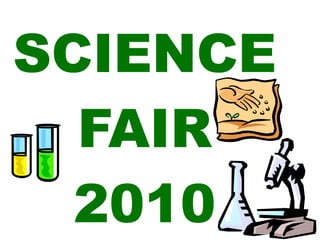
10 Sciencefair Presentation
- 1. SCIENCE FAIR 2010
- 2. 1. Choosing a topic Base your project on a topic you are interested in. Have you ever come across something and wondered – Why? Science Fair is your opportunity to investigate the answer. Your project must serve a purpose to the community or New Zealand There are many categories you can enter under … plants, environment, consumer science, electricity, electronics, communication, energy, light, sound, heat, physics, innovations, chemistry … and more!
- 3. 2. Keeping a Log Book - Keep a log book from day one. - Use diary entries to record what you do, what you see and what you find. Every step of your investigation needs to be recorded – even any mistakes or accidents, this is all part of being a scientist. - Your log book should show how much time you’ve spent on your investigation and how extensive it has been. - All detailed information can go into the log. E.g Letters written and replies received, newspaper articles, research into the topic, photo’s, etc.
- 4. 3. Thinking about your topic - Brainstorm ideas and key words to do with your topic. Organise these into a mind map. - Use your mind map to formulate questions you have about your topic. - Find out more about your topic. Use magazines, books, library, internet or experts to find more ideas or learn more about your topic. - Record in your log book
- 5. 4. Decide on a Key Question - What is it that you want to find out? What are you going to investigate? - Write your question as an aim. E.g. My aim is to find out …
- 6. 5. Hypothesis - Your hypothesis is like a prediction. What do you think the answer might be to your question? - What is the most likely outcome of your experiment? What is the expected result? Why do you think this will happen? - Record your hypothesis before you start the investigation. - Remember that your original hypothesis may not be correct and may lead to further investigations. This is all part of the scientific process.
- 7. 6. Designing your experiment - This is your method for answering your question and testing your hypothesis. - To make your test fair you need to think about VARIABLES. What are you actually measuring? What will you need to keep the same to conduct a fair test? What will you change? - Your method is what you are going to do, the procedure. Remember when writing your procedure to include a list of the materials and equipment needed to conduct your experiment. - Your method needs to be written so that anyone could read it and repeat your experiment exactly and gain a similar result.
- 8. 7. Recording your results - Your results are your observations and/or measurements. - In order to record your results you need to ask yourself, what am I observing or measuring? - How will you record your results so that your data is organised and easy to understand? - You may decide to use a table, diagrams, graphs, or table. For some experiements you may wish to take photographs to show changes over time. - Remember that you need to also record the conditions in which you conducted your experiments. E.g What was the weather like? Temperature? - It is important to REPEAT EXPERIMENTS in order to double check your results or to ensure results are consistent.
- 9. 8. Analysing your results - What do your results tell you? - What patterns or trends did you find in your data? - You need to explain your data. - You need to have collected enough data to support a conclusion. REPEAT EXPERIMENTS! - Your data needs to be organised into appropriate tables, graphs or charts.
- 10. 9. Conclusion - What did you find out? - Stand back and think about what you have achieved. Have you solved the question you originally thought of? - How do your results compare with your original hypothesis? Were they different? - Use scientific ideas to explain your results. Why did you get the results you did? - REMEMBER TO ANSWER YOUR QUESTION!
- 11. 10.Evaluation and Application - What difficulties did you experience during your investigation? - How could you improve your investigation? Eg. Fairness, accuracy … etc. - How could your findings be applied or used? - Has your investigation given you ideas for further research? - Where to next?
- 12. Helpful Hints … Start Early – Don’t leave it until the last minute. Judges are looking for originality and innovative ideas. Make sure your investigation is a fair test. Avoid investigations involving animals. Make sure you are familiar with the judging criteria. Your display needs to be eye catching. Data needs to be displayed in a way that leads the eye easily from one stage to the next. Keep a detailed and thorough log book. Make sure that your display board doesn’t look cluttered. Repeat your experiment more than once. Answer your question. Find out as much as possible about your topic – especially the scientific concepts relating to your topic. Keep all your information and data together in a box, so you don’t lose any of your hard work. ENJOY THE EXPERIENCE!